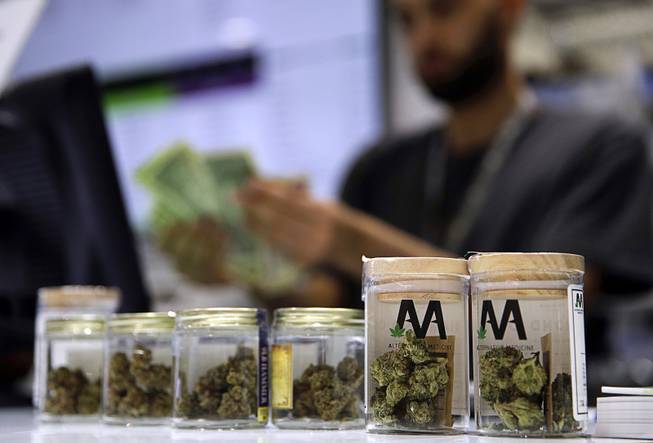
John Locher / AP
A cashier rings up a marijuana sale at a dispensary in Las Vegas, July 1, 2017.
Wednesday, Oct. 2, 2019 | 2 a.m.
A marijuana bill that could revolutionize the operations of Nevada’s cannabis industry passed the U.S. House of Representatives last week, the first standalone cannabis bill in history to do so.
The Secure and Fair Enforcement (SAFE) Banking Act would allow all marijuana dispensaries and cultivators, which tend to operate in cash-only environments due to the federal illegality of marijuana, to work with banks and credit unions.
Without access to financial institutions, cannabis businesses face “a logistical nightmare,” said Riana Durrett, executive director of the Nevada Dispensary Association. Many dispensaries are forced to hoard cash collected through transactions, creating security concerns and increasing the risk of money-laundering or corruption.
Durrett and others from Nevada’s cannabis industry, representatives from local banking and credit associations and Rep. Dina Titus gathered in a Las Vegas dispensary Monday to celebrate the passage of the SAFE Banking Act. Titus was one of 206 co-sponsors of the House bill, which passed 321-103; nearly all Democrats voted for the measure, while just under half of Republicans voted for it.
“If we’re going to tax (marijuana) and get benefits for our schools and our roads and community services, we need to have a better accounting of it,” Titus said. “Being able to do banking, you can do that.”
Recreational marijuana became legal in Nevada on Jan. 1, 2017, and dispensaries began opening shortly thereafter. Ten other states have passed recreational and medical marijuana, and 22 others permit medical marijuana alone.
Although some local banks and credit unions have agreed to work with marijuana establishments in Nevada, many don’t for fear that they could be penalized by a federal banking regulator. Other states with legal marijuana industries face similar challenges.
“Banks are required to follow federal law, and because federal law still criminalizes the sale and distribution of marijuana, providing bank services means that banks will run the risk of violating the Bank Secrecy Act and anti-money laundering regulations,” said Nevada Bankers Association President Phyllis Gurgevich.
Even taxation of marijuana must be done using cash alone, Titus added, which creates a liability for the state Department of Taxation.
“You just go in and dump sacks of cash on the table to pay your taxes,” Titus said. “We need all of that to be more through the legitimate banking and credit union systems.”
The preponderance of cash on the premises of dispensaries has made them an occasional target of thieves, said Metro Police Sgt. Chuck Callaway. Despite the tight security measures in place, including cameras and detailed, state-mandated security training for employees, some break-ins have occurred.
“Luckily, it hasn’t been too widespread,” Callaway said. “Our fear is that it just isn’t something that has caught on yet.”
Some dispensaries have formed relationships with local banks that are willing to risk the federal penalties, but not all have, Durrett said. Employees at many dispensaries must be paid in cash as a result, although they still pay federal income taxes and “follow all the other rules.”
Across dispensaries, one thing is constant: Plenty of time, money and resources are spent on determining how to carry out operations without breaking any laws, Durrett said.
“You have people who are operating lawful businesses, they’re doing everything lawfully, and then it’s making it very difficult for them to follow anti-money laundering laws,” she said. “It’s a loss for everyone.”
The SAFE Banking Act now moves from the Democratic-majority House to the Republican-controlled Senate, where its chance of passing is slimmer. Titus is nonetheless hopeful that the American people’s overall support for legal marijuana and the public safety concerns posed by the current state of banking could sway some Republican senators.
“It’s not a question of, ‘Do you want legal marijuana?’ But in states where it exists, do you want them to do banking?” Titus said. “I think that’s a pretty persuasive argument for some of those Republicans.”
